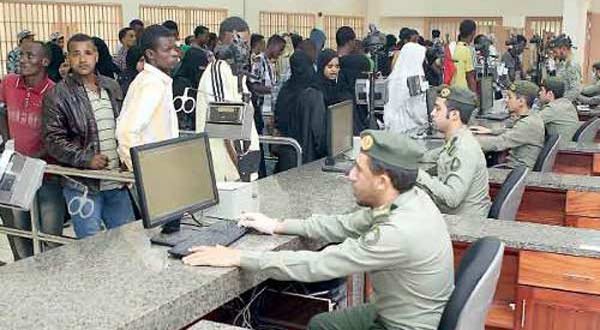

NUMBER OF SAUDIS IN PRIVATE SECTOR HAS DOUBLED SINCE INTRODUCTION OF LABOR REFORMS
JEDDAH, Jan 24 — Saudi Arabia says it has deported “more than a quarter million” foreign migrant workers over the past three months. The Interior Ministry said that the foreigners had been residing in the country illegally and were in violation of labor laws.
The deportations began after November 4 with a nationwide campaign targeting many of the Kingdom’s nine million migrant laborers. Authorities say the crackdown will open more jobs for its own citizens.
Labor Minister Adel Fakieh said on Sunday that the number of its citizens working for private companies has doubled in the 30 months since it introduced wide-ranging reforms to tackle long-term unemployment. “At this point in time the employment in the private sector is about 1.5 million. This is 101 percent more than it was 30 months ago,” the minister said at a conference in Riyadh.
In 2011, Riyadh imposed stricter penalties for failing to meet quotas for hiring Saudi citizens. In 2012 it also introduced a levy of SR2,400 ($640) a year on every foreigner a company employed over the number of its Saudi workers.
Fakieh later told reporters that the increase of 750,000 jobs over the past 30 months only included those who had remained in the workforce, but that around 500,000 others had taken jobs and then left.
He added that since the reforms were introduced, the average starting salary for Saudis had risen and that graduates of technical training colleges now found a job on average five months after qualifying, as opposed to 13 months in 2011.
Some companies, particularly in labor-intensive industries such as construction, have complained that the reforms have caused bottlenecks in important projects and cut profits by increasing the wage bill. Expatriates are typically paid less than Saudis.
Others have said they struggle to find qualified Saudis to replace expatriates despite high government spending on university scholarship programs and technical training colleges. They have also complained that employment rules make it too hard to fire Saudis.
Young Saudi job-seekers often say they are reluctant to look for work in private companies, because government agencies offer better pay, benefits and job security. Last week Riyadh announced it was introducing unemployment insurance for Saudis who lost their jobs for “reasons beyond their control” and who had been in work for more than a year. The policy was designed to encourage more young Saudis to look for jobs in the private sector.
The minister said the introduction of unemployment insurance was also designed to “make it easier” for the government to relax employment rules and give companies more flexibility to fire workers who did not perform well. He also said a crackdown last year on foreigners breaking visa regulations by working for companies that did not sponsor their work permit was necessary to close loopholes that allowed employers to dodge hiring quotas. —IINA